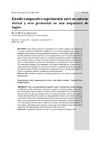Please use this identifier to cite or link to this item:
https://accedacris.ulpgc.es/jspui/handle/10553/74867
| Title: | Estudio comparativo experimental entre un entorno virtual y otro presencial en una asignatura de Inglés | Other Titles: | Experimental study comparing face-to-face and online teaching / learning of an English subject | Authors: | De Juan González, Pilar | UNESCO Clasification: | 580105 Pedagogía experimental 570111 Enseñanza de lenguas |
Keywords: | Estudio comparativo Enseñanza presencial versus virtual Enseñanza a distancia ALAO Comparative study, et al |
Issue Date: | 2019 | Journal: | Porta Linguarum | Abstract: | Este artículo muestra los resultados de un estudio empírico para determinar la posible existencia de diferencias significativas en la mejoría lograda por dos grupos de estudiantes que cursaron la misma asignatura de inglés en la universidad, Inglés Turístico de nivel B1, durante el mismo semestre y con la misma profesora, uno de manera presencial con apoyo virtual y otro de manera virtual. La evaluación cuantitativa se realizó mediante pruebas, iniciales y finales, en las que se evaluó el nivel en las distintas destrezas comunicativas, que se complementaron con otros dos instrumentos de investigación de índole cualitativa, un cuestionario realizado a los estudiantes y dos diarios elaborados por la docente con el seguimiento de la asignatura con cada grupo. Se obtuvo un rendimiento académico superior por parte del grupo virtual en la destreza de la interacción escrita y ligeramente superior en la de la comprensión auditiva e igualdad en las demás destrezas. This is an experimental comparative study to ascertain the possible existence of differences in the achievement levels of two groups of university students who studied the same English subject, English for Tourism, with an intermediate level, during the same semester and with the same teacher. One of the groups followed a face-to-face method, whereas the other followed an online one. The quantitative research was carried out through some initial and final tests which determined the level achieved in each communicative skill. These were complemented with two qualitative research instruments, a questionnaire filled in by the students and two diaries written by the teacher describing the implementation of both subjects. The findings show that the on-line group achieved better results in the written interaction and listening skills and similar results in the other skills. |
URI: | https://accedacris.ulpgc.es/handle/10553/74867 | ISSN: | 1697-7467 | Source: | Porta Linguarum [ISSN 1697-7467], n. 32, p. 119-133 |
| Appears in Collections: | Artículos |
Page view(s) 5
229
checked on Jan 11, 2026
Download(s)
120
checked on Jan 11, 2026
Google ScholarTM
Check
Share
Export metadata
Items in accedaCRIS are protected by copyright, with all rights reserved, unless otherwise indicated.
